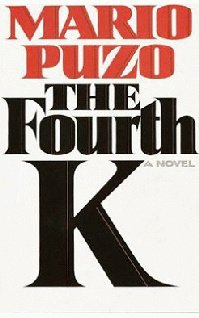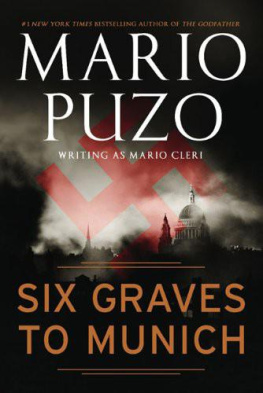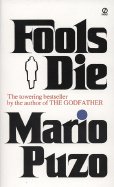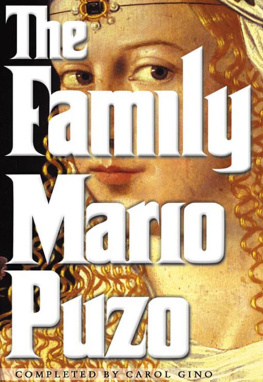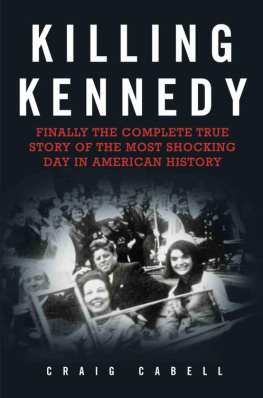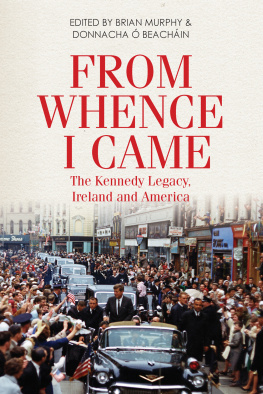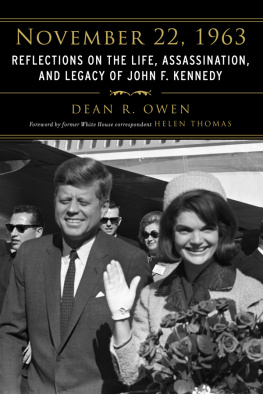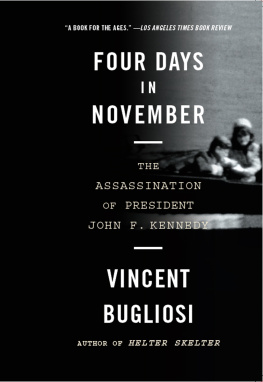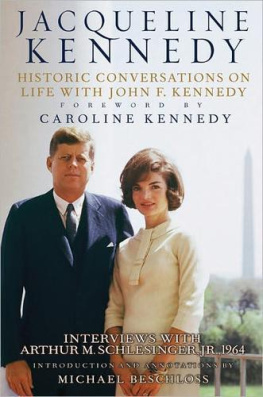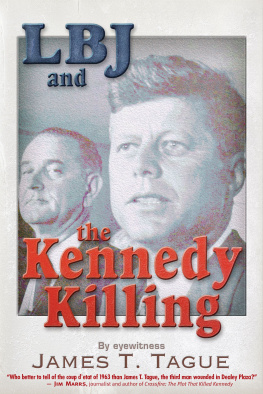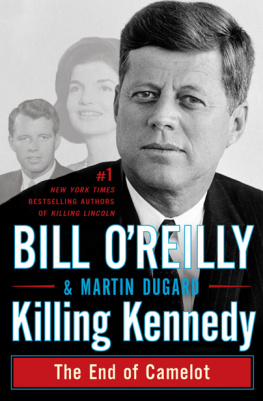FOR MY CHILDREN Anthony Dorothy Eugene Virginia Joseph
BOOK 1
GOOD FRIDAY EASTIR SUNDAY
OLIVER OLIPHANT WAS one hundred years old and his mind was as clear as a bell. Unfortunately for him.
It was a mind so clear, yet so subtle, that while breaking a great many moral laws, it had washed his conscience clean. A mind so cunning that Oliver Oliphant had never fallen into the almost inevitable traps of everyday life: he had never married, never run for political office and never had a friend he trusted absolutely.
On a huge heavily guarded secluded estate only ten miles from the White House, Oliver Oliphant, the richest man in America and possibly the most powerful private citizen, awaited the arrival of his godson, the Attorney General of the United States, Christian Klee.
Oliphant's charm equaled his brilliance; his power rested on both. Even at the advanced age of one hundred his advice was still sought by great men who relied on his analytic powers to such an extent that he had been nicknamed the "Oracle."
As adviser to presidents the Oracle had predicted economic crises, Wall Street crashes, the fall of the dollar, the flight of foreign capital, the fantasies of oil prices. He had predicted the political moves of the Soviet Union, the unexpected embraces of rivals in the Democratic and Republican parties. But above all he had amassed ten billion dollars. It was natural that advice from such a rich man be valued, even when wrong.
But the Oracle was nearly always right.
Now on this Good Friday, the Oracle was worried about one thing: the birthday party to celebrate his one hundred years on this earth. A party to be held on Easter Sunday in the Rose Garden of the White House, the host none other than the President of the United States, Francis Xavier Kennedy.
It was a permissible vanity for the Oracle to take great pleasure in this spectacular affair. The world would again remember him for one brief moment. It would be, he thought sadly, his last appearance on stage.
In Rome, on Good Friday, seven terrorists made their final preparations to assassinate the Pope of the Roman Catholic Church. This band of four men and three women believed they were liberators of mankind. They called themselves the Christs of Violence.
The leader of this particular band was an Italian youth well seasoned in the technique of terrorism. For this particular operation he had assumed the code name Romeo; it pleased his youthful sense of irony, and its sentimentality sweetened his intellectual love of mankind.
On the late afternoon of Good Friday, Romeo rested in a safe house provided by the International One Hundred.
Lying on rumpled bed sheets stained with cigarette ash and days of night sweat, he read a paperback edition of The Brothers Karamazov. His leg muscles cramped with tension, perhaps fear, it didn't matter. It would pass as it always did. But this mission was so different, so complex, involved so much danger to the body and the spirit. On this mission he would be truly a Christ of Violence, that name so Jesuitical it always moved him to laughter.
Romeo had been born Armando Giangi, to rich high society parents, who subjected him to a languid, luxurious, religious upbringing, a combination that so offended his ascetic nature that at the age of sixteen he renounced worldly goods and the Catholic Church. So now, at twenty-three, what greater rebellion could there be for him than the killing of the Pope? And yet there was still, for Romeo, a superstitious dread. As a child he had received holy confirmation from a red-hatted cardinal. Romeo remembered always that ominous red hat painted in the very color of the fires of hell.
So confirmed by God in every ritual, Romeo prepared himself to commit a crime so terrible that hundreds of millions would curse his name, for his true name would become known. He would be captured. That was part of the plan. But in time he, Romeo, would be acclaimed as a hero who helped change the existing cruel social order. What was infamous in one century would be seen as saintly in the next. And vice versa, he thought with a smile. The very first Pope to take the name of Innocent, centuries ago, had issued a papal bull authorizing torture, and had been hailed for propagating the true faith and rescuing heretic souls.
It also appealed to Romeo's youthful sense of irony that the Church would canonize the Pope he was planning to kill. He would create a new saint. And how he hated them, all these popes. This Pope Innocent IV, Pope Pius, Pop edict, oh they sanctified too much, these amassers of wealth, these suppressors of the true faith of human freedom, these pompous wizards who smothered the wretched of the earth with their magic of ignorance, their hot insults to credulity.
He, Romeo, one of the First Hundred of the Christs, of Violence, would help erase that crude magic. Vulgarly called terrorists, the First Hundred were spread over Japan, Germany, Italy, Spain and even the tulipy Dutch. It was worth noting that there were none of the First Hundred in
America. That democracy, that birthplace of freedom, had only intellectual revolutionaries who fainted at the sight of blood. Who exploded their bombs in empty buildings after warning people to leave; who thought public fornication on the steps of houses of state an act of idealistic rebellion. How contemptible they were. It was not surprising that America had never given one man to the Revolutionary Hundred.
Romeo put a halt to his daydreaming. What the hell, he didn't know if there were a hundred. There might be fifty or sixty, it was just a symbolic number. But such symbols rallied the masses and seduced the media. The only fact he really knew was that he, Romeo, was one of the
First Hundred, and so was his friend and fellow conspirator Yabril.
One of the many churches of Rome chimed its bells. It was nearly six in the evening of this Good Friday. In another hour Yabril would arrive to review all the mechanics of the complicated operation. The killing of the Pope would be the opening move of a brilliantly conceived chess game, a series of daring acts that delighted Romeo's romantic soul.
Yabril was the only man who had ever awed Romeo, physically and mentally.
Yabril knew the treacheries of governments, the hypocrisies of legal authority, the dangerous optimism of idealists, the surprising lapses in loyalty of even the most dedicated terrorists. But most of all Yabril was a genius of revolutionary warfare. He was contemptuous of the small mercies and infantile pity that affect most men. Yabril had but one aim, to free the future.
And Yabril was more merciless than Romeo could ever be. Romeo had murdered innocent people, betrayed his parents and his friends, assassinated a judge who had once protected him. Romeo understood that political killing might be a kind of insanity-he was willing to pay that price. But when Yabril said to him, "If you cannot throw a bomb into a kindergarten, then you are not a true revolutionary," Romeo told him, "That I could never do."
But he could kill a Pope.
Yet in the last dark Roman nights, horrible little monsters, only the fetuses of dreams, covered Romeo's body with sweat distilled from ice.
Romeo sighed, rolled off his filthy bed to shower and shave before Yabril arrived. He knew that Yabril would judge his cleanliness a good sign, that morale was high for the coming mission. Yabril, like many sensualists, believed in a certain amount of spit and polish. Romeo, a true ascetic, could live in shit.
On the Roman streets, on his walk to visit Romeo, Yabril took the usual precautions. But in fact everything really depended on internal security, the loyalty of the fighting cadres, the integrity of the First Hundred. But not they, not even Romeo, knew the full extent of the mission.

